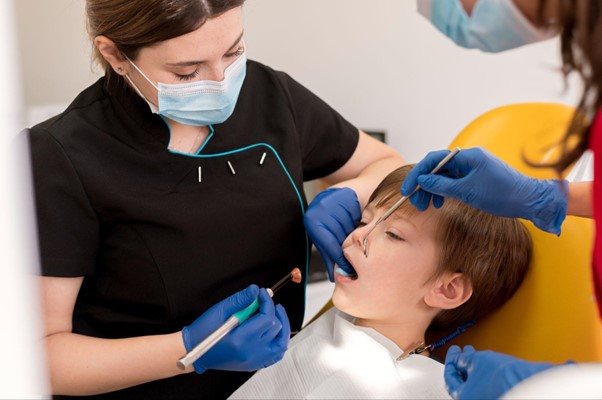Does Your Child Need Sedation? Tips to Ease Your Concerns
80% of people wearing braces are minors. A large number of children may undergo these dental check-up visits and treatment. In contrast, other children may develop anxiety or fear, and therefore, dental procedures are more challenging to both the child and parent. However, how can you tell if your child requires sedation?
There are a number of options available for sedation and you should fully explore what’s best for your child. The information provided here is a selection of pieces of guidance that we expect will lessen your preoccupations and ensure that your kid’s stay at the dentist’s office will be without major issues.
The Basics of Dental Sedation
Dental sedation refers to medications developed to ease patients in carrying out a dental non-disruptive procedure, and the patient is supposed to remain in a calm or sleeping state throughout the whole treatment.
Pediatric sedation in dentistry ranges from light to deep, depending on the procedure to be undertaken and the child’s requirements. Several forms of sedation are commonly used in pediatric dentistry:
- Nitrous Oxide (Laughing Gas)
- Oral Sedation
- IV Sedation
- General Anesthesia
In any case, you should discuss the options with your orthodontist to decide which type of sedation is suitable for the needs of your child, their health, and the kind of procedure they will undergo.
When Might Sedation Be Needed?
Although most procedures do not require sedation, some cases may call for additional measures to ensure the patient stays calm during treatment and receive the dental health benefits from their treatment. 50% of patients develop dental fear during childhood. Other scenarios may include:
- Severe anxiety or fear
- Complex or Lengthy Procedures
- Behavioral Issues
- Multiple Procedures
- Medical Conditions
When a child has some physical ailment, for instance, some procedures can trigger stress, potentially aggravating existing conditions. Every dentist will consider a child’s medical history before prescribing sedation to the child.
Benefits of Sedation for Children
Sedation has several advantages that could help ease your stressed child during a dental appointment and promote long-term oral health. Some of the key benefits include:
- Reduced Anxiety
- Pain Management
- Faster Treatment
- Prevention of Trauma
- Fewer Interruptions
Some children are restless and may squirm during a dental check-up. This can complicate the dentist’s ability to complete the procedure effectively. Sedation reduces the anxiety your child may feel, helping them stay calm and cooperative during the procedure to encourage successful results.
Addressing Parental Concerns About Safety
Sedation, guided by a professional, is definitely safe, but people are still worried about it. See to it that your child’s treatment is undertaken by an established staff consisting of highly qualified sedation technicians.
Qualified Professionals
In most cases, only dentists are trained in the administration of these treatments. Experienced dental practices are well-trained in administering sedation safely.
Health Assessments
Sedation is provided only after the patient completes a thorough evaluation by a healthcare provider. This includes reviewing your child’s medical history, allergies, and any other conditions that might prevent them from being sedated.
Monitoring During Sedation
When performing the treatment, your child’s pulse, blood pressure, and oxygen levels will be constantly recorded and regulated. This ensures their safety throughout the procedure.
Minimal Side Effects
Sedation generally has few side effects, including drowsiness or nausea, which are easily controlled. In most instances, the complications begin to manifest immediately after the procedure and last just a few minutes.
Key Questions to Ask Your Dentist
Before making any decisions about sedation, there are a few questions that you should ask your dentist to ensure that you are fully informed:
- What kind of sedation do you advise?
- What are the risks and or side effects?
- What precautions are taken to ensure my child’s safety during the process?
- How can I help my child stay calm and cooperative during the appointment?
- What will happen during the recovery period after sedation?
By asking these questions, you will be able to use your best judgment and stand tall with the knowledge that you are placing your child in the hands of experienced professionals.
Alternatives to Sedation
Sedation is one method of dealing with disruptions during dental procedures, but it should not be viewed as the only solution. Here are some alternatives that may help your child feel more at ease:
- Behavioral Techniques
- Local Anesthesia
- Distraction and Comforting
Many children find comfort in distractions during a procedure by watching videos and listening to music. It can also help to comfort them by giving them a word or two of encouragement.
Key Takeaway
When your child requires sedation, it may be because of fear, a lengthy procedure, or a medical condition – that is why it is crucial to discuss the details with your dentist to maximize the dental health benefits from their treatment.






